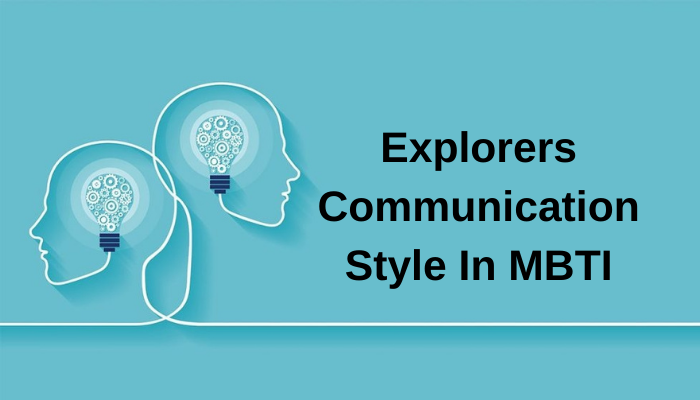Explorers, also known as the Artisans in the MBTI (Myers-Briggs Type Indicator) personality assessment, are individuals with a preference for sensing, intuition, thinking, and perceiving.

These preferences can influence their communication style in the following ways:
- Direct and straightforward: Explorers tend to be direct and straightforward in their communication style, and they may prefer to get to the point without beating around the bush.
- May be more expressive and animated: Because they prefer intuition, Explorers may be more expressive and animated in their communication, and they may use gestures and facial expressions to convey their message.
- May be more open-minded: These individuals tend to be open-minded and may be willing to consider new ideas and approaches to communication.
- May be more adaptable: Explorers tend to be adaptable and may be able to adjust their communication style to fit different situations and audiences.
- May be more persuasive: Because they tend to be logical and analytical, Explorers may be skilled at persuading others and may be able to effectively communicate their ideas and opinions.
- May struggle with emotional expression: These individuals may struggle with expressing their emotions and may have difficulty connecting with others on an emotional level.
- May struggle with follow-through: Explorers may struggle with follow-through and may have difficulty meeting deadlines or completing tasks.
- May have difficulty with rules and procedures: Because they tend to be more spontaneous and flexible, Explorers may have difficulty with rules and procedures and may struggle with following established guidelines and protocols.
Overall, individuals with an Explorer communication style tend to be direct and straightforward, expressive and animated, and open-minded and adaptable.
They may be skilled at persuading others, but they may struggle with emotional expression and follow-through. They may also have difficulty with rules and procedures.
Table of Contents
- 1 Explorers Virtuoso (ISTP-A/ISTP-T)
- 2 Adventurer (IFSP-A/ISFP-T)
- 3 Entrepreneur (ESTP-A/ESTP-T)
- 4 Entertainer (ESFP-A/ESFP-T)
- 5 15 ADVANTAGES OF SENTINELS IN COMMUNICATION ISSUES
- 6 15 DISADVANTAGES OF EXPLORERS IN COMMUNICATION ISSUES
- 7 30 QUESTIONS TO ASK TO EXPLORERS ABOUT COMMUNICATION
- 8 30 GENERAL TIPS FOR EXPLORERS FOR COMMUNICATION
Explorers Virtuoso (ISTP-A/ISTP-T)
Virtuosos, also known as the Artisans in the MBTI (Myers-Briggs Type Indicator) personality assessment, are individuals with a preference for sensing, thinking, perceiving, and introversion.

These preferences can influence their communication style in the following ways:
- Practical and to-the-point: Virtuosos tend to be practical and to-the-point in their communication style, and they may prefer to get straight to the point without wasting time on unnecessary details.
- Direct and straightforward: These individuals tend to be direct and straightforward in their communication, and they may not beat around the bush or sugarcoat their message.
- May be more reserved: Because they prefer introversion, Virtuosos may be more reserved in their communication and may not share as much about themselves or their thoughts and feelings as others.
- May struggle with emotional expression: These individuals may struggle with expressing their emotions and may have difficulty connecting with others on an emotional level.
- May be more logical and analytical: Because they prefer thinking, Virtuosos may be more logical and analytical in their communication style, and they may rely on facts and evidence to support their arguments.
- May be more spontaneous: Because they prefer perceiving, Virtuosos may be more spontaneous and flexible in their communication, and they may adapt to new situations and ideas easily.
- May struggle with communication in large groups: These individuals may struggle with communication in large groups, as they may feel overwhelmed or may not feel comfortable speaking in front of a large audience.
- May be more effective in one-on-one communication: Because they tend to be more reserved, Virtuosos may be more effective in one-on-one communication, where they can have more control over the conversation.
Overall, individuals with a Virtuoso communication style tend to be practical and to-the-point, direct and straightforward, and logical and analytical.
They may struggle with emotional expression and communication in large groups, but they may be more effective in one-on-one communication. They may also be more spontaneous and adaptable.
Adventurer (IFSP-A/ISFP-T)
Adventurers, also known as the Artisans in the MBTI (Myers-Briggs Type Indicator) personality assessment, are individuals with a preference for sensing, feeling, perceiving, and introversion.

These preferences can influence their communication style in the following ways:
- May be more expressive and emotional: Adventurers tend to be more expressive and emotional in their communication, and they may use gestures, facial expressions, and tone to convey their message.
- May be more sensitive to others: Because they prefer feeling, Adventurers may be more sensitive to others and may be more aware of their emotions and needs.
- May be more adaptable: Because they prefer perceiving, Adventurers may be more adaptable and open-minded in their communication style, and they may be willing to consider new ideas and approaches.
- May struggle with assertiveness: These individuals may struggle with assertiveness and may have difficulty expressing their own needs and wants.
- May be more effective in one-on-one communication: Because they tend to be more reserved, Adventurers may be more effective in one-on-one communication, where they can have more control over the conversation.
- May struggle with communication in large groups: These individuals may struggle with communication in large groups, as they may feel overwhelmed or may not feel comfortable speaking in front of a large audience.
- May be more hesitant to speak up: Adventurers may be hesitant to speak up or share their thoughts and ideas, especially in unfamiliar or uncomfortable situations.
- May have difficulty with confrontation: These individuals may have difficulty with confrontation and may avoid conflict or difficult conversations whenever possible.
Overall, individuals with an Adventurer communication style tend to be expressive and emotional, sensitive to others, and adaptable.
They may struggle with assertiveness and communication in large groups, and they may be more effective in one-on-one communication.
They may also be hesitant to speak up and may have difficulty with confrontation.
Entrepreneur (ESTP-A/ESTP-T)
Entrepreneurs, also known as the Artisans in the MBTI (Myers-Briggs Type Indicator) personality assessment, are individuals with a preference for sensing, thinking, perceiving, and extraversion.

These preferences can influence their communication style in the following ways:
- Direct and straightforward: Entrepreneurs tend to be direct and straightforward in their communication style, and they may prefer to get to the point without beating around the bush.
- May be more expressive and animated: Because they prefer extraversion, Entrepreneurs may be more expressive and animated in their communication, and they may use gestures and facial expressions to convey their message.
- May be more persuasive: These individuals tend to be logical and analytical, and they may be skilled at persuading others and effectively communicating their ideas and opinions.
- May struggle with emotional expression: Entrepreneurs may struggle with expressing their emotions and may have difficulty connecting with others on an emotional level.
- May be more adaptable: Because they prefer perceiving, Entrepreneurs may be more adaptable and open-minded in their communication style, and they may be willing to consider new ideas and approaches.
- May be more spontaneous: These individuals tend to be spontaneous and flexible, and they may be able to adapt to new situations and ideas easily.
- May be more effective in group communication: Because they prefer extraversion, Entrepreneurs may be more effective in group communication and may be comfortable speaking in front of a large audience.
- May struggle with communication in more formal settings: These individuals may struggle with communication in more formal or structured settings, as they may prefer a more flexible and spontaneous approach.
Overall, individuals with an Entrepreneur communication style tend to be direct and straightforward, expressive and animated, and persuasive.
They may struggle with emotional expression and may be more effective in group communication. They may also be more adaptable and spontaneous, but may struggle with communication in more formal settings.
Entertainer (ESFP-A/ESFP-T)
Entertainers, also known as the Artisans in the MBTI (Myers-Briggs Type Indicator) personality assessment, are individuals with a preference for sensing, feeling, perceiving, and extraversion.

These preferences can influence their communication style in the following ways:
- Expressive and animated: Entertainers tend to be expressive and animated in their communication style, and they may use gestures, facial expressions, and tone to convey their message.
- May be more sensitive to others: Because they prefer feeling, Entertainers may be more sensitive to others and may be more aware of their emotions and needs.
- May be more adaptable: Because they prefer perceiving, Entertainers may be more adaptable and open-minded in their communication style, and they may be willing to consider new ideas and approaches.
- May be more spontaneous: These individuals tend to be spontaneous and flexible, and they may be able to adapt to new situations and ideas easily.
- May be more effective in group communication: Because they prefer extraversion, Entertainers may be more effective in group communication and may be comfortable speaking in front of a large audience.
- May struggle with communication in more formal settings: These individuals may struggle with communication in more formal or structured settings, as they may prefer a more flexible and spontaneous approach.
- May have difficulty with confrontation: Entertainers may have difficulty with confrontation and may avoid conflict or difficult conversations whenever possible.
- May struggle with assertiveness: These individuals may struggle with assertiveness and may have difficulty expressing their own needs and wants.
Overall, individuals with an Entertainer communication style tend to be expressive and animated, sensitive to others, and adaptable.
They may be more effective in group communication, but may struggle with communication in more formal settings.
They may also have difficulty with confrontation and may struggle with assertiveness.
15 ADVANTAGES OF SENTINELS IN COMMUNICATION ISSUES
- Good listening skills: Sentinels tend to be good listeners, and they may be able to effectively communicate and understand others’ perspectives and needs.
- Clear and concise communication: These individuals tend to be clear and concise in their communication, and they may prefer to get straight to the point without wasting time on unnecessary details.
- Respect for rules and procedures: Sentinels may have a strong sense of respect for rules and procedures, and they may follow established guidelines and protocols when communicating.
- Good problem-solving skills: These individuals tend to be practical and logical, and they may be skilled at problem-solving and finding solutions to communication issues.
- Good follow-through: Sentinels tend to be responsible and reliable, and they may have a strong sense of follow-through when it comes to communication tasks and responsibilities.
- Respect for authority: These individuals may have a strong respect for authority and may be more likely to listen to and follow the guidance of their superiors.
- Good at providing structure and stability: Sentinels may be able to provide structure and stability to communication efforts, and they may be able to maintain order and organization in group discussions.
- Good at giving and receiving feedback: These individuals may be able to effectively give and receive feedback, and they may be open to constructive criticism in order to improve their communication skills.
- Good at conflict resolution: Sentinels may be skilled at conflict resolution and may be able to effectively address and resolve communication issues as they arise.
- Good at maintaining confidentiality: These individuals tend to be discreet and may be able to maintain confidentiality when communicating sensitive information.
- Good at maintaining professional boundaries: Sentinels may be able to maintain professional boundaries in their communication and may be able to effectively separate personal and professional matters.
- Good at maintaining reliability: These individuals tend to be reliable and may be able to consistently communicate effectively with others.
- Good at maintaining consistency: Sentinels may be able to maintain consistency in their communication and may be able to effectively communicate the same message to multiple people or groups.
- Good at maintaining professionalism: These individuals tend to be professional in their communication and may be able to effectively represent their company or organization.
- Good at maintaining clear communication channels: Sentinels may be able to effectively establish and maintain clear communication channels, ensuring that all necessary parties are informed and able to effectively communicate with one another.
15 DISADVANTAGES OF EXPLORERS IN COMMUNICATION ISSUES
- May struggle with structure and consistency: Explorers may struggle with maintaining structure and consistency in their communication, and they may prefer a more spontaneous and flexible approach.
- May struggle with maintaining professionalism: These individuals may struggle with maintaining professionalism in their communication, and they may have difficulty adhering to established rules and protocols.
- May struggle with maintaining confidentiality: Explorers may struggle with maintaining confidentiality when communicating sensitive information, and they may have difficulty separating personal and professional matters.
- May struggle with maintaining reliability: These individuals may struggle with maintaining reliability in their communication, and they may have difficulty consistently following through on tasks and responsibilities.
- May struggle with maintaining clear communication channels: Explorers may struggle with establishing and maintaining clear communication channels, and they may have difficulty ensuring that all necessary parties are informed and able to effectively communicate with one another.
- May struggle with maintaining clear boundaries: These individuals may struggle with maintaining clear boundaries in their communication, and they may have difficulty separating personal and professional matters.
- May struggle with maintaining focus: Explorers may struggle with maintaining focus in their communication, and they may have difficulty staying on track and addressing all necessary topics.
- May struggle with maintaining consistency: These individuals may struggle with maintaining consistency in their communication, and they may have difficulty communicating the same message to multiple people or groups.
- May struggle with maintaining clarity: Explorers may struggle with maintaining clarity in their communication, and they may have difficulty expressing their thoughts and ideas in a clear and concise manner.
- May struggle with maintaining tact: These individuals may struggle with maintaining tact in their communication, and they may have difficulty avoiding confrontational or sensitive topics.
- May struggle with maintaining assertiveness: Explorers may struggle with being assertive and expressing their own needs and wants in their communication.
- May struggle with maintaining emotional control: These individuals may struggle with maintaining emotional control in their communication, and they may have difficulty managing their own emotions and those of others.
- May struggle with maintaining a sense of formality: Explorers may struggle with maintaining a sense of formality in their communication, and they may have difficulty adapting to more formal or structured settings.
- May struggle with maintaining attention to detail: These individuals may struggle with paying attention to detail in their communication, and they may have difficulty effectively communicating all necessary information.
- May struggle with maintaining objectivity: Explorers may struggle with maintaining objectivity in their communication, and they may have difficulty considering all perspectives and remaining unbiased.
30 QUESTIONS TO ASK TO EXPLORERS ABOUT COMMUNICATION
- How do you adapt to new situations in your communication?
- How do you think on your feet in your communication?
- How do you build relationships through your communication?
- How do you express yourself in your communication?
- How do you persuade others through your communication?
- How do you connect with others emotionally in your communication?
- How do you build trust through your communication?
- How do you handle conflict in your communication?
- How do you maintain flexibility in your communication?
- How do you maintain openness in your communication?
- How do you maintain creativity in your communication?
- How do you maintain enthusiasm in your communication?
- How do you maintain a positive attitude in your communication?
- How do you maintain honesty in your communication?
- How do you maintain a sense of humor in your communication?
- How do you maintain clear boundaries in your communication?
- How do you maintain focus in your communication?
- How do you maintain consistency in your communication?
- How do you maintain clarity in your communication?
- How do you maintain tact in your communication?
- How do you express your own needs and wants in your communication?
- How do you manage your own emotions and those of others in your communication?
- How do you adapt to more formal or structured communication settings?
- How do you pay attention to detail in your communication?
- How do you remain objective in your communication?
- How do you effectively communicate sensitive or difficult information?
- How do you maintain confidentiality in your communication?
- How do you separate personal and professional matters in your communication?
- How do you maintain reliability in your communication?
- How do you establish and maintain clear communication channels?
30 GENERAL TIPS FOR EXPLORERS FOR COMMUNICATION
- Be adaptable: Explorers should be open to new situations and ideas, and they should be willing to adapt to changing communication needs and challenges.
- Think on your feet: These individuals should be spontaneous and flexible, and they should be able to think on their feet and come up with creative solutions to communication issues.
- Build relationships: Explorers should be outgoing and sociable, and they should be skilled at building relationships and connecting with others through their communication.
- Express yourself: These individuals should be expressive and animated in their communication, and they should use gestures, facial expressions, and tone to convey their message effectively.
- Persuade others: Explorers should be persuasive and skilled at communicating their ideas and opinions in a way that influences others.
- Connect with others emotionally: Because they tend to be sensitive to others’ emotions, Explorers should be able to effectively connect with others on an emotional level in their communication.
- Build trust: These individuals should be able to build trust through their communication, and they should be able to effectively establish rapport with others.
- Handle conflict effectively: Explorers should be skilled at conflict resolution and should be able to effectively address and resolve communication issues as they arise.
- Maintain flexibility: These individuals should be flexible and should be able to effectively adapt to changing communication needs and situations.
- Maintain openness: Explorers should be open to new ideas and approaches in their communication, and they should be willing to consider different perspectives.
- Maintain creativity: These individuals should be creative and should be able to come up with innovative solutions to communication issues.
- Maintain enthusiasm: Explorers should be enthusiastic and energetic in their communication, and they should be able to inspire and motivate others through their words and actions.
- Maintain a positive attitude: These individuals should have a positive attitude, and they should be able to effectively communicate and convey a sense of optimism and positivity.
- Maintain honesty: Explorers should be honest and genuine in their communication, and they should be able to effectively build trust and rapport through their honesty.
- Maintain a sense of humor: These individuals should have a good sense of humor, and they should be able to use it to lighten the mood and improve communication in difficult or tense situations.
- Use body language: Explorers should be mindful of their body language and use it to convey their message and emotions effectively.
- Practice active listening: These individuals should practice active listening, which involves fully engaging with the speaker, asking clarifying questions, and providing feedback.
- Use clear and concise language: Explorers should strive to use clear and concise language in their communication to ensure that their message is understood.
- Be mindful of tone: These individuals should be mindful of the tone they use in their communication, as it can greatly impact how their message is received.
- Use appropriate communication channels: Explorers should choose the most appropriate communication channels based on the situation and the message they want to convey.
- Avoid multitasking: These individuals should avoid multitasking while communicating, as it can distract from the message and undermine the importance of the conversation.
- Take breaks: Explorers should take breaks as needed to prevent burnout and maintain energy and enthusiasm in their communication.
- Seek feedback: These individuals should seek feedback from others to improve their communication skills and identify areas for growth.
- Practice empathy: Explorers should practice empathy and try to see things from others’ perspectives to improve their communication and build stronger relationships.
- Manage time effectively: These individuals should manage their time effectively to ensure that they have sufficient time to communicate effectively and address all necessary topics.
- Use eye contact: Explorers should use eye contact to establish a connection with the speaker and show interest in the conversation.
- Use facial expressions: These individuals should use facial expressions to convey their emotions and reactions to the conversation.
- Use gestures: Explorers should use appropriate gestures to enhance their message and improve the impact of their communication.
- Use silence effectively: These individuals should use silence effectively to give others the opportunity to speak and to allow for reflection and processing.
- Maintain good posture: Explorers should maintain good posture to convey confidence and professionalism in their communication.

https://psytify.com/flirting-styles-mbti-sentinels-2023/
https://psytify.com/famous-people-according-to-their-mbti-type/
https://psytify.com/what-is-mbti/

